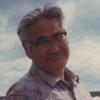
Digital Asset Information
Project: Bethel Communities of Memory
Date of Interview: Jan 27, 1996
Narrator(s): Matthew Beans
After clicking play, click on a section to navigate the audio or video clip.
Sections
Bethel's Yup'ik name
How Matthew's father got his last name
Click play, then use Sections or Transcript to navigate the interview.
After clicking play, click a section of the transcript to navigate the audio or video clip.
Transcript
George Hohman: Next to me is a fellow that's been around a while. And he told a story recently about how Bethel got its name, not Bethel but the -- but the real name. Matthew Beans.
Matthew Beans: Well, back there in 1985, because we did not have calendars in them days, there was a place called Pilot Village between Marshall and Pilot’s Station, that one year people were going hungry because there was hardly any fish on the Yukon River.
So this couple came over here to, across the river where this old army base was.
They built a smokehouse. And they stayed there about 3 years. I guess, that place just above Bethel where there -- where there was lots of black fish there.
They found out that place and they built a smokehouse. Smoke -- Bethel, the original name is Mamterilleq, which is not the native name for Kuskokwim. Mamterilleq means the smokehouse on the Yukon.
And I guess that's when they went back over to the Yukon, the name stuck to Bethel here.
In them days when the Moravians came across there, they built a place there on the high knoll.
In them days, they were not allowed to build a smokehouses in the high places where the, I’m using the Irish name for Leprechauns because I don't -- I haven't heard the leprechauns up here in Alaska or Ircinrraq, what you call leprechauns.
I know in the United States in the English language, I haven't heard the proper name for that leprechaun.
And that's the one reason they didn't build down here by the old Moravian church because them days, our ancestors used to believe that these leprechauns they took them under the building, under the ground.
That same reason Marshall, Pilot Station¸ Pitkas Point, and Mountain Village, they were all originally fish camps.
And they never build houses because of the leprechauns. They'd take them in the house, in the -- under the hills, and this Pilot Village was a big place them days.
For that reason they called Bethel, Mamterilleq, which means a smokehouse in Bethel area.
And back in 1900's they had, over on the Yukon, they had this guy by the name of Charles Mizner from California.
He was on the Kusko -- Yukon River building school houses.
And they built one there at old Fort Hamilton, Mountain Village, Pilot Station, and Russian Mission.
And the school teachers moved to these villages and then they start telling these people to move to villages like Mountain Village, Pilots -- Pitkas Point, Pilot Station and Marshall and Russian Mission.
So their kids can be educated.
And this guy, back in '52, Charles Mizner came up from California and asked me, do you know how you got your name Matthew Beans?
Beans, my father's name was Captain Bean because he worked on the stern wheeler, plowing from St. Michaels to Dawson, them days.
And there was this guy, he had the store there at Mountain Village and as he -- my dad was getting up -- getting off the stern wheeler,
he asked Norman Shepard, you know that guy? Yeah, he says, yeah, he's from this village.
And he asked him what his name was and them days, they didn't have any names and this Charles Mizner asked him, what does he do on the stern wheeler?
He said, he's a pilot on the stern wheeler and he had a 100 pound bag of beans on his shoulder going up to the store.
And he asked him, why don't we call him Captain Beans? And that's how the name stuck.

